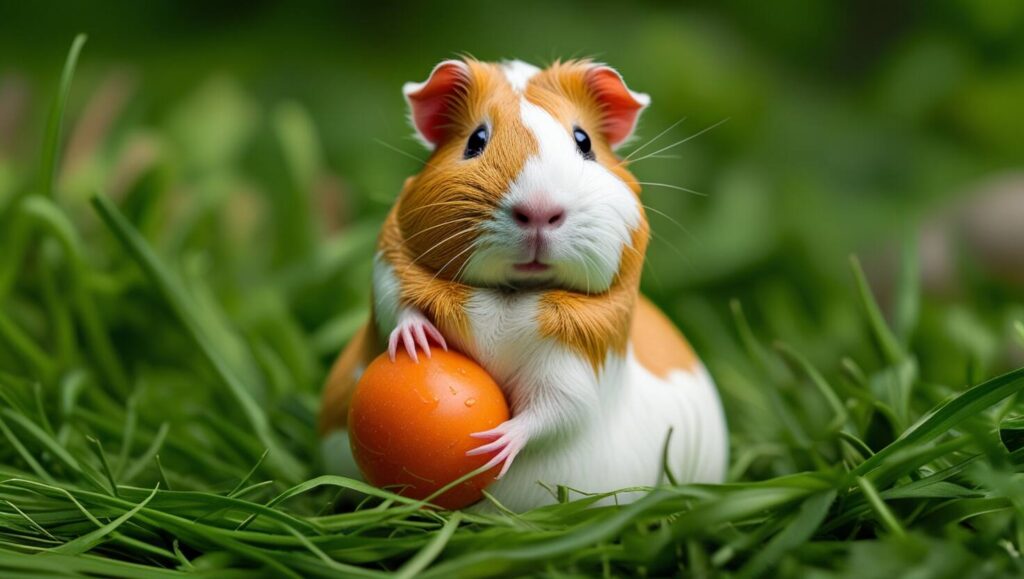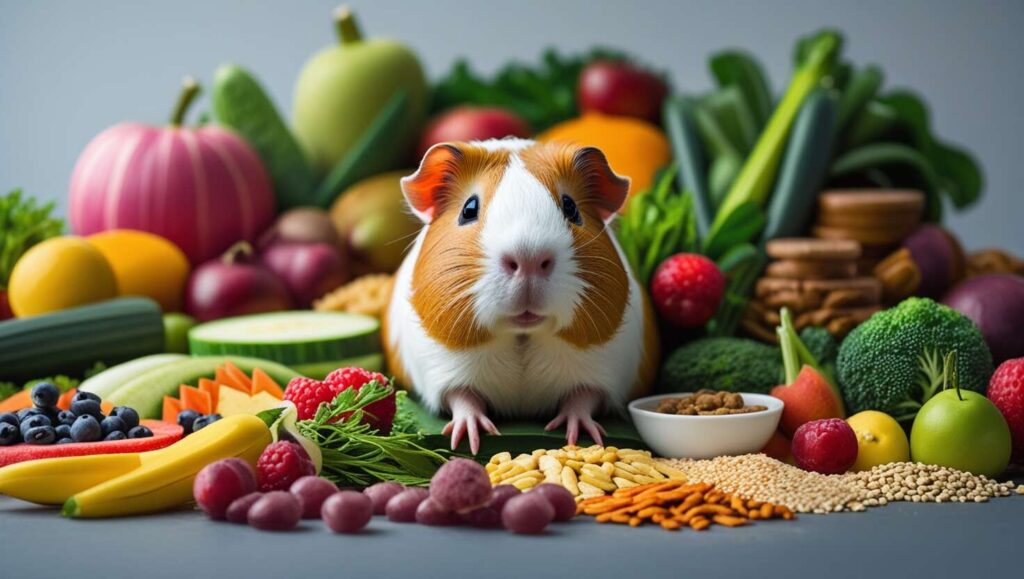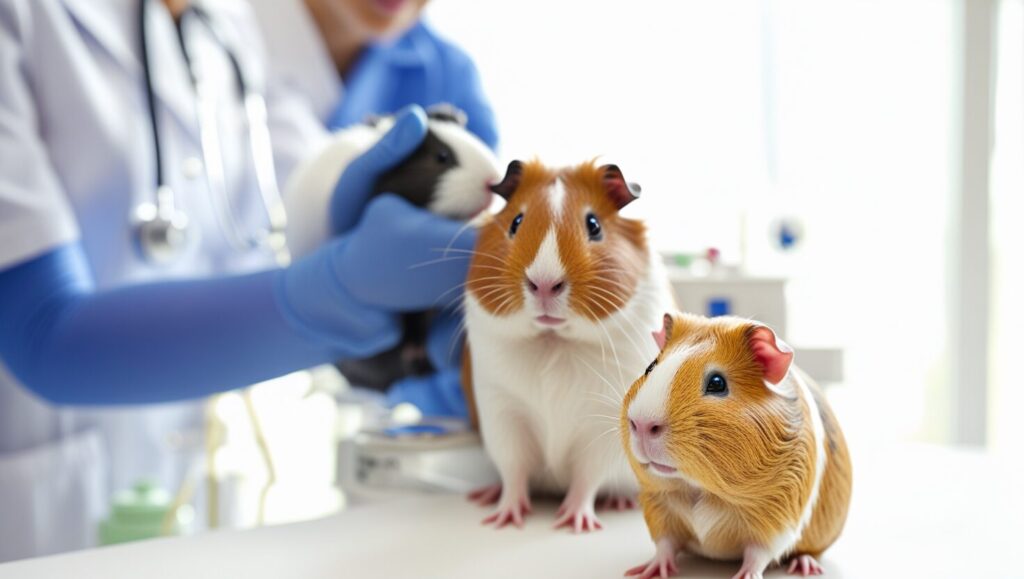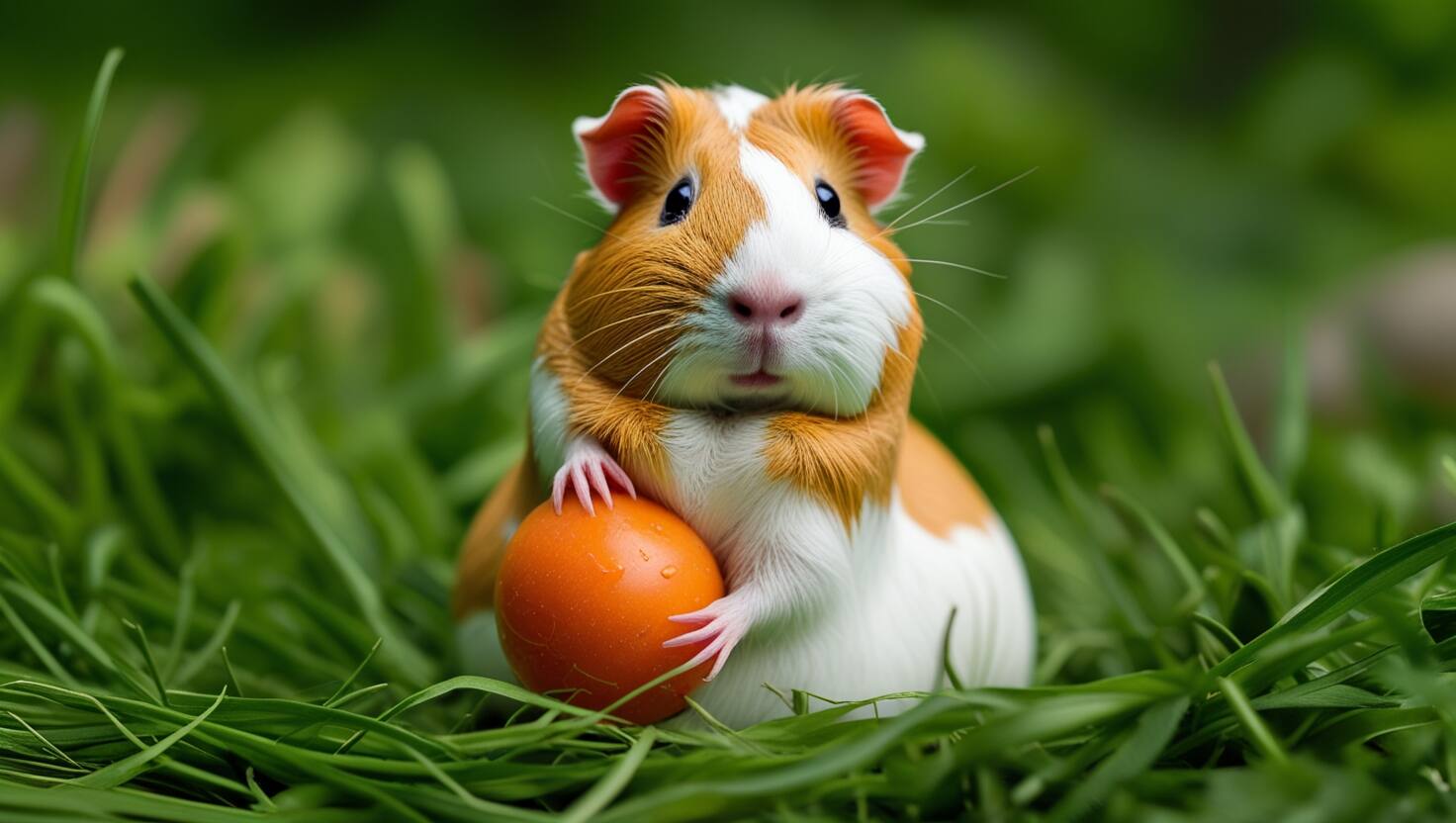Essential Tips To Prevent Deadly Bloat In Guinea Pigs: Simple Diet Hacks Every Owner Must Know

Prevent bloat in guinea pigs with a high-fiber diet of hay, fresh vegetables, and quality pellets while avoiding gas-producing foods. Spot symptoms like a Swollen Belly or lethargy early—hydrate with gripe water, massage their abdomen, and contact a vet immediately to save your guinea pig’s life!
Bloat In Guinea Pigs
Guinea pigs are adorable little creatures, but they can also be quite smelly, especially when their cage gets messy, or when they leave their unique scent mark. For any guinea pig owner, it’s not uncommon to deal with the occasional stinky nostrils moment. But beyond the mess and odor, there’s something far more concerning—bloat. Gastric dilatation-volvulus (GDV) is a serious condition that affects guinea pigs, and it can be life-threatening if not treated. Although GDV is well-known in dogs, it can also impact smaller pets like guinea pigs. Unfortunately, it remains a common yet poorly known issue in small animal veterinary practices.
Bloat in guinea pigs is a major problem because it leads to the buildup of bacterial gas in the stomach and intestines, causing extreme swelling and discomfort. The condition can quickly turn into a life-threatening emergency, similar to GDV in dogs. Without corrective surgery, the results can be fatal, and many guinea pigs die suddenly from this condition. It’s crucial for guinea pig owners to act quickly at the first sign of bloating, as specific clinical signs may be absent, making it harder to detect. Due to a lack of experience with this species in some veterinary circles, the condition’s high mortality rate can go unnoticed.
If your guinea pig is experiencing bloating, it could be triggered by various factors, such as diet or stress. When too much gas builds up, the guinea pig’s digestive system, which is broadly similar to ours, cannot pass it easily. As a result, too much gas can become dangerous, leading to this serious health issue. Prompt treatment is key—monitor for any signs of discomfort, such as a distended belly or changes in behavior, and take your pet to the vet immediately if you suspect something is wrong. Being aware of the symptoms will help you prevent serious health complications in the future.
Although bloating can seem like a completely normal occurrence, if left untreated, it can spiral into a much bigger issue. While guinea pigs are unable to pass large quantities of gas through their intestines, knowing the signs of bloating and acting promptly can make a difference in saving your pet’s life. Regular checkups, keeping the cage clean, and a proper diet are all part of the prevention strategy for this dangerous condition called guinea pig bloat.
What Causes Bloating In Guinea Pigs? Common Causes And Prevention Tips
Feeding guinea pigs requires balance and consistency. Sudden changes can disrupt their sensitive digestion. Bloating in guinea pigs may result from various factors, such as gastrointestinal issues, respiratory conditions, or even the presence of tumors. Some typical triggers for bloating in guinea pigs are:
Gas
Gas is one of the most common causes of bloating in guinea pigs. This uncomfortable condition can occur when your guinea pig eats too much hay, consumes spoiled food, or even swallows too much air while eating. Since guinea pigs are prone to gas buildup, it’s important to monitor their diet closely. If your pet is regularly experiencing bloating, reducing the amount of hay or ensuring the food is fresh can help prevent these gas-related issues.
Constipation
Constipation can be a significant factor in causing bloating in guinea pigs. If a guinea pig is constipated, their intestine may become enlarged, which can lead to discomfort and bloating. It’s important to watch for warning signs of constipation, as this can result in serious issues for your guinea pig. Regular monitoring of their Right Diet and ensuring they have proper hydration and fiber can help prevent constipation and the bloating that comes with it.
Enteritis
Enteritis is an inflammation of the small intestine that can lead to bloating and diarrhea in guinea pigs. This condition is often the result of a bacterial infection or occurs when a guinea pig eats spoiled food. It’s important to monitor your guinea pig closely for these symptoms and ensure their food is fresh and clean to prevent such issues. Infections like these can quickly worsen, so keeping an eye on any signs of bloating or changes in digestion is crucial.
Tumors
In rare cases, bloating in guinea pigs may be caused by tumors in the abdominal cavity. These growths can create pressure in the digestive system, leading to discomfort and swelling. If you notice persistent bloating that doesn’t seem to be related to diet or other common issues, it’s important to consider the possibility of tumors. A vet can perform the necessary tests to determine if a tumor is the cause and suggest appropriate treatment options. Keeping an eye on any abnormal signs early can help prevent severe complications.
Sudden Change In Diet
A sudden change in diet can be harmful to your guinea pig’s health. The key to feeding a guinea pig is maintaining balance and regularity. Their sensitive digestive system is easily affected by disruptions, which is why even a small sudden change can cause a disorder. It’s important to introduce new foods slowly to avoid any digestive issues or discomfort. Keeping a consistent Right Diet helps prevent bloating and other complications in guinea pigs.
Getting The Diet Right To Prevent Bloating
A balanced diet is the most important step in preventing bloating in guinea pigs. Feed your guinea pig plenty of hay, fresh vegetables, and a high-quality guinea pig pellet to support their digestive system. Avoid processed or sugary treats, as these can cause digestive issues and lead to health problems. Overfeeding is also a common mistake, so always provide controlled portions and ensure they have access to fresh water, regularly cleaning their water bottle to prevent bacteria from growing.

Some vegetables, although loved by guinea pigs, should be limited as they can cause bloating when eaten in excess. These include cauliflower, cabbage, Brussels sprouts, kale, and broccoli. Instead of these, encourage your guinea pig to eat high-fiber hay, which keeps the digestive system moving smoothly and reduces the risk of bloating. If your guinea pig shows symptoms of bloat, such as a Swollen Belly, address it quickly to prevent complications.
To help manage bloating symptoms if they occur, try to hydrate your piggy with gripe water via a syringe, as it’s traditionally used to treat gas build-up in babies and works the same way for guinea pigs. Follow this with a gentle massage on the sides of the belly, repeating it 2-3 times over a few hours. If the bloat is not relieved, don’t delay—contact a vet for assistance to ensure your guinea pig gets the care they need.
Excess Of Fermentable Vegetables
Feeding your guinea pig excess fermentable vegetables can easily lead to gas and bloating. Vegetables from the cabbage family, such as Brussels sprouts, cauliflower, kale, and both white and red cabbage, are known to cause digestive issues when given in large amounts. Additionally, sweet fruits and fresh herbs, if fed in excess, can also create gas buildup in your guinea pig’s sensitive stomach. Keeping the diet balanced and avoiding overfeeding these items is essential for preventing bloating.
Ingestion Of Food Too Quickly
When guinea pigs are gluttonous and rush to eat, they often face issues from ingestion of food too quickly. By eating too quickly, they tend to swallow air that their bodies cannot expel, which can lead to bloating. It’s important to monitor your guinea pig’s eating habits and ensure they aren’t rushing through meals. Slowing down their feeding can help prevent air from being trapped, reducing the risk of discomfort.
Stress
Stress is known to be the cause of many diseases, and bloating is one of them. When a guinea pig experiences stress, it stimulates the contractions of the intestine, which can lead to discomfort and bloating. Managing stress in your guinea pig is crucial for their overall health. Reducing triggers that cause anxiety, such as sudden changes in their environment or loud noises, can help keep their digestion in balance and prevent issues like bloating.
Dehydration
Dehydration can lead to serious health issues, including bloating in guinea pigs. It’s essential to regularly check the quality of the water given to your guinea pig. The water should always be clean, free of algae, and not too cold. Make sure to keep a close eye on your guinea pig’s water intake, as dehydration may occur if they are not drinking enough. If you notice reduced water consumption, you’ll need to step in to ensure they stay hydrated to prevent bloating and other complications.
Cold, Wet, Or Rotten Food
Feeding your guinea pig cold, wet, or rotten food can lead to serious digestive issues, including bloating. Just like with water, the quality of food must be irreproachable to ensure their health. Any compromise in food quality increases the risk of fermentation in their sensitive digestive system, which can cause discomfort. It’s important to check the food regularly and provide fresh, clean items to avoid any risk of fermentation that could harm your guinea pig.
Bloat in guinea pigs is usually caused by abrupt changes in their diet, which can upset the balance of bacteria in their intestines. The sudden overgrowth of gas-producing bacteria becomes more likely when new foods like grass, kale, or cabbage are introduced too quickly. It’s important to make these changes gradually to avoid issues. Additionally, it’s worth noting that grass clippings must never be fed to guinea pigs due to the risk of potentially lethal plant matter being mixed in.
How To Prevent And Treat Bloat In Guinea Pigs: Essential Tips And Remedies

Gradual Introduction Of New Foods
To prevent your piggy from developing guinea pig bloat, there are several important steps you should take. First, always introduce new foods gradually, especially if you’re tempted to give your guinea pig fresh grass during the warmer months. Sudden changes in diet can upset their digestive system, so it’s better to go slow.
Importance Of Exercise And Spacious Housing
Make sure your guinea pig gets plenty of exercise in a playpen, such as those from Kavee, or in a secure room. Keeping your guinea pig active helps maintain a healthy gut. Your guinea pigs should also be kept in a large guinea pig cage that meets their needs. Avoid tiny cages from pet stores, as they don’t provide enough space for your guinea pig to move around. An active piggy will stay healthy and happy, which helps prevent digestive issues.
The Role Of Diet In Preventing Bloat
Additionally, provides unlimited quality hay to support a healthy digestive system. Hay should be the foundation of their diet to keep their stomach functioning well. It’s also important to avoid feeding your guinea pig pellets with corn or cereals. These ingredients can be harmful over time as they are often difficult for guinea pigs to digest. Instead, focus on feeding your guinea pig foods that are easy to digest. By sticking to appropriate foods, you can reduce the risk of bloating and other digestive problems.
Hydration And Comfort Measures
In the meantime, there are some things you can do to help your guinea pig feel more comfortable. Encourage your guinea pig to drink water, as this can help flush out their system and relieve any constipation that might be contributing to the bloating. Keeping your guinea pig hydrated can ease discomfort and help prevent further complications.
Veterinary Treatments For Bloat
If bloating occurs, veterinarians may attempt to decompress the stomach by passing a tube through the mouth into the stomach to remove gas or fluid. However, in guinea pigs, this method is often ineffective when performed alone. Treatment for bloat usually requires surgery to correct the torsion of the stomach, which involves a surgical opening called gastronomy. If necrosis (tissue death) is found, it may need to be treated with debridement or even amputation of damaged tissue.
Seeking veterinary care as soon as possible is crucial. However, if a vet isn’t immediately available, there are a few steps you can try at home to help manage the situation.
- Vegetable Oil: Using Vegetable Oil to Help Prevent Bloat: One method that may help ease bloating in guinea pigs is by administering a teaspoon of vegetable oil. This can assist in breaking down the foamy gas that builds up in their stomach, allowing it to pass more easily through the digestive system. By doing this, you can help relieve discomfort and make it easier for your guinea pig to recover from the bloating. However, always consult a vet before trying any home remedies.
- Gripe Water: Using Gripe Water for Guinea Pig Bloat: Peter Gurney suggests using gripe water for guinea pigs in the same way it’s used for babies. You can use a syringe to give it to your guinea pig, making sure to follow the proportions recommended for human infants. This method can help ease bloating and discomfort in your guinea pig, offering a gentle solution similar to how it helps with gas in babies. Always ensure you’re administering the right amount to avoid any complications.
- Abdominal Massage: Using Abdominal Massage for Bloating Relief: One simple method to help relieve bloating in guinea pigs is abdominal massage. Gently massaging the sides of the abdomen can help assist in releasing trapped gas. This can provide relief by allowing the gas to move through the digestive system more easily. Be sure to handle your guinea pig carefully, as they might be sensitive in this area due to discomfort. This technique can be useful alongside other treatments to reduce bloating symptoms.
Explore our guide on recognizing the key Symptoms Of Bloat In Guinea Pigs and learn to spot the early warning signs.
For the best chance of recovery and to lessen complications, it’s important to limit your guinea pig’s diet to just hay and water until their digestive system returns to its normal rhythm. This simple diet helps avoid further stress on their stomach. In some cases, a vet may recommend antibiotics to support healing, alongside these dietary adjustments. Keeping things simple during recovery can make a big difference in how quickly your guinea pig improves.
Prevention Of Bloat In Guinea Pigs
Prevention of bloat in guinea pigs starts with reducing stress levels, as veterinarians suggest. One way to achieve this is by separating guinea pigs into male and female groups, which helps them feel more at ease. Additionally, ensure they are fed approved foods specific to their dietary needs and avoid mixes that might not provide the right nutrition. Taking these steps will decrease the chance of bloat and keep your guinea pigs healthy and happy.
Feeding Tips To Reduce Bloat In Guinea Pigs
- Offer your adult guinea pigs a diet rich in high-fibre mixes (18-20% crude fibre) to support digestion.
- Include a high-quality guinea pig pellet as part of their daily meals.
- Provide hay and fresh vegetables daily to ensure a balanced diet.
- Feed in small, frequent portions instead of large meals to reduce gas build-up in their stomachs.
- Allow your guinea pigs to eat at their own pace, ensuring they can finish meals within 15 minutes. Avoid offering more food if they seem overwhelmed or regurgitate.
- Skip gas-producing foods like alfalfa hay and sugary options such as carrots.
- Make sure they always have unlimited access to fresh hay and water for hydration and fibre intake.
- Regular exercise is essential to prevent obesity, which increases the risk of bloat.
Conclusion
Bloat in guinea pigs is a mostly preventable issue with proper care and attention. Start by following your vet’s advice to decide the best course of action for your individual guinea pigs. Maintaining a healthy diet is key to preventing bloat, ensuring their meals include plenty of hay, fresh vegetables, and high-quality pellets. Since guinea pigs are sensitive to changes, try mixing food options instead of suddenly switching them, allowing your piggies to adjust easily without stress.
Regular exercise is also essential for their health. Make sure they have large, clean cages with accessories like tunnels to encourage activity. Watch for visible swelling, a distended abdomen, or any abnormal behavior such as lethargy or discomfort. These could indicate bloat, which can become fatal without timely care. If you suspect bloat, seek immediate veterinary care. Remember, guinea pigs are wonderful pets but also fragile, so never hesitate to ask your vet for guidance to ensure their healthy, happy life.
Kindly note: The content shared in this blog is gathered from online sources, some of which may not be verified. For accurate guidance on caring for your guinea pig, it is recommended to seek advice from a qualified veterinarian.
FAQ
What are the key symptoms to watch for in guinea pigs with bloat?
Look for a swollen or distended belly, lack of appetite, lethargy, or signs of pain such as teeth grinding or hunching. If diarrhea or unusual stool accompanies these symptoms, seek veterinary care immediately.
How can you help relieve bloat in guinea pigs?
Bloat can be alleviated using medications like simethicone (anti-gas) and gut motility stimulants prescribed by a vet. Gentle belly massages, the use of vibrating tools (like an electric toothbrush), or even a short car ride may help move the gas through their digestive system.
Which foods are known to cause bloat in guinea pigs?
Cruciferous vegetables (broccoli, cabbage, cauliflower), bananas, and grains (like wheat and millet) can cause bloating. Avoid these foods or offer them sparingly and ensure they are introduced gradually to their diet.
What steps can you take to remove gas from a guinea pig’s stomach?
Administer crushed Rennie Rapize or Buscopan mixed with water (vet-approved doses) via syringe. Gently massage their abdomen to encourage gas movement. Always consult a vet before trying at-home remedies.
What is a commonly used medicine for treating gas in guinea pigs?
Simethicone is often used to break down gas bubbles in the gut. While it’s not a cure for severe bloat, it can provide some relief. Always pair it with vet-recommended treatments and monitoring.
How can guinea pig bloat be treated at home?
Place the guinea pig on your lap and gently massage its belly to stimulate gas movement. Offer small amounts of fluids to prevent dehydration and use a heating pad (set on low) to keep them warm if they seem cold. If symptoms persist, seek veterinary care.
Does grass contribute to bloat in guinea pigs?
Yes, if introduced too quickly. Start with 10-20 minutes of grass exposure per day and increase gradually. Sudden changes in diet or overconsumption can upset their stomach and lead to bloat.
What precautions should you take after a guinea pig recovers from bloat?
Provide a diet consisting mainly of hay (80% of their food), with fresh vegetables and pellets in moderation. Ensure they always have access to fresh water. Monitor them closely for any signs of bloat, especially after introducing new foods.
How can you prevent gas bloat in guinea pigs?
Feed a fiber-rich diet of hay, introduce new foods slowly, and avoid known bloat-causing items like broccoli and bananas. Provide regular exercise to encourage gut motility, and keep their living area clean to reduce stress and prevent infections.
How should you monitor a guinea pig after they recover from bloat?
Track their eating habits, stool consistency, and activity level. Any signs of reduced appetite, lethargy, or unusual stools should be addressed immediately. Regularly check their weight to ensure they are maintaining a healthy range.

